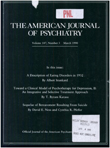The amphetamine challenge test in patients with borderline disorder
Abstract
The authors used amphetamine as a psychopharmacological probe to investigate the hypothesis that patients with borderline personality disorder are prone to psychosis following ingestion of a dopamine agonist. Sixteen patients with borderline personality disorder participated in the study. Significant increases in the mean total Brief Psychiatric Rating Scale scores and in activation and thought disturbance factors after amphetamine administration were noted in the sample. Patients with diagnoses of both schizotypal and borderline personality disorders worsened transiently with amphetamine administration, but patients with only the borderline diagnosis improved. These results indicate the usefulness of pharmacological probes to further understand DSM-III axis II disorders.
Access content
To read the fulltext, please use one of the options below to sign in or purchase access.- Personal login
- Institutional Login
- Sign in via OpenAthens
- Register for access
-
Please login/register if you wish to pair your device and check access availability.
Not a subscriber?
PsychiatryOnline subscription options offer access to the DSM-5 library, books, journals, CME, and patient resources. This all-in-one virtual library provides psychiatrists and mental health professionals with key resources for diagnosis, treatment, research, and professional development.
Need more help? PsychiatryOnline Customer Service may be reached by emailing [email protected] or by calling 800-368-5777 (in the U.S.) or 703-907-7322 (outside the U.S.).



